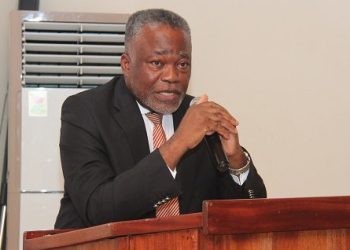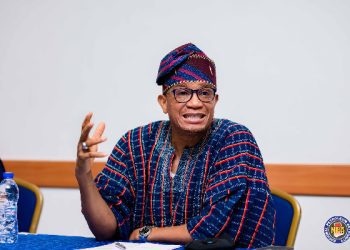After a lengthy and intense debate, the Ghanaian Parliament has adopted the report of the committee tasked to investigate the leaked tape on which senior police officers and a former Chairman of the NPP in Northern region BUgri Naabu were heard plotting the removal of the Inspector General of Police George Akufo Dampare.
The report of the committee generated heated controversy in the Parliament of Ghana after it came to light that the Chairman Samuel Atta Akyea refused to sign the report.
Atta Akyea unhappy
Chairman of the Committee, Samuel Atta Akyea explained that his refusal to sign the report was premised several reservations he had with the document including the fact that some witnesses had perjured themselves which undermined the committee’s role and powers.
He emphasized the need for a thorough investigation into the matters raised by the committee, rather than just accepting information presented by witnesses.
The Chairman further disclosed that he suggested to the committee to subpoena call logs to verify claims made by witnesses, particularly regarding the Inspector General of Police’s (IGP) interactions with Chief Bugri Nabu.
Chairman Atta Akyea also criticized the committee’s decision to elevate a conversation on a tape to the level of conspiracy, calling it “illogical” and “inconsequential”.
He also alleged that there were attempts to politicize the issue on the premise of the IGP capacity to influence the outcome of an election.
The Chairman further disagreed with some of the report’s recommendations, including calling for a review of Article 21 of the 1992 Constitution and subjecting the nominee to parliamentary approval.
This, he opined would create unnecessary constitutional protections for someone in a security position.
Samuel Atta Akyea also expressed the view that the committee was reduced to a “conveyor belt” hence did not delve deeply into the matters that came up during their work.
He urged the House to reject the report, citing a lack of substance and foundation in evidence.
The Vice Chairman of the Committee, James Agalga, has expressed disagreement with several points made by the Chairman of the committee in a detailed address to Parliament.
According to James Agalga, the committee did not elevate conspiracy to the level of criminal jurisprudence. He emphasized that the committee’s focus was on investigating the IGP’s handling of certain matters, and not making accusations of criminal wrongdoing.
He also disputed claims that the committee had “cut and paste” from another document, arguing that the committee had conducted its own independent investigations and gathered evidence. He accused the Chairman of attempting to discredit their work.
Agalga fights back
In a sharp rebuttal, Vice Chairman of the Committee James Agalga disputed the claims of the Chairperson.
He said committee was of the opinion that investigations into Superintendent Asare’s involvement in recording an audio conversation was irrelevant to the main issues under investigation and was an attempt to create a distraction.
James Agalga also disputed claims that the committee refused to hear the evidence of a whistleblower as the disagreements over whether to treat an anonymous document as a petition had stalled their inquiry.
He accused the Chairman of attempting to politicize the issue.
Furthermore, James Agalga rejected requests for call logs from the IGP without a warrant under Section 30 of the Security and Intelligence Agencies Act.
He argued that this would have been an invasion of privacy and an attempt to bypass legal procedures.
The Vice Chairman (Agalga) also addressed the issue of an unsigned petition, emphasizing that the committee had a duty to verify the authenticity of any petitions presented to them.
He argued that an unsigned document could not be considered as a formal petition and accused the Chairman of attempting to bypass proper procedures and undermine the committee’s authority.
This disagreement between the Chairman and Vice Chairman of the committee sparked intense debate among members of the house, with some calling for greater accountability and transparency in the police service.
Presenting the committee’s report on the floor, James Agalga disclosed that they found that there was a conspiracy to remove the IGP and certain senior police officers were involved.
The report also highlighted several issues with the IGP’s leadership and recommended that the President take disciplinary action against the officers involved.
Parliament’s role is oversight, not investigation
In his ruling, the Speaker of Parliament Alban Sumana Kingsford Bagbin stated that the committee was not a trial court and should not have delved into matters that are outside its terms of reference.
According to him the committee’s remit does not cover investigations into allegations of extra-judicial killings, stating that it was outside the mandate of the committee.
Parliament adopts report
Supporting the motion for the adoption of the report, Deputy Minority Leader, Emmanuel Armah Buah, commended the committee for their thoroughness and emphasized the importance of their findings.
He urged the president invoke Section 19 of the Police Service Act and take disciplinary action against the senior police officers involved in the conspiracy.
On his part, Majority Leader Alexander Afenyo Markins in support of the motion, disagreed with James Agalga’s stance on the fact that the admissibility of evidence is not crucial in a committee investigation.
The Majority Leader also advocated for a review of the country’s constitution and urged Parliamentarians to work together to support constitutional reforms and agree on a set of reforms to improve the country’s democracy.
The house accordingly adopted the committee’s report after a voice vote.
Story: www.radiogoldlive.com












